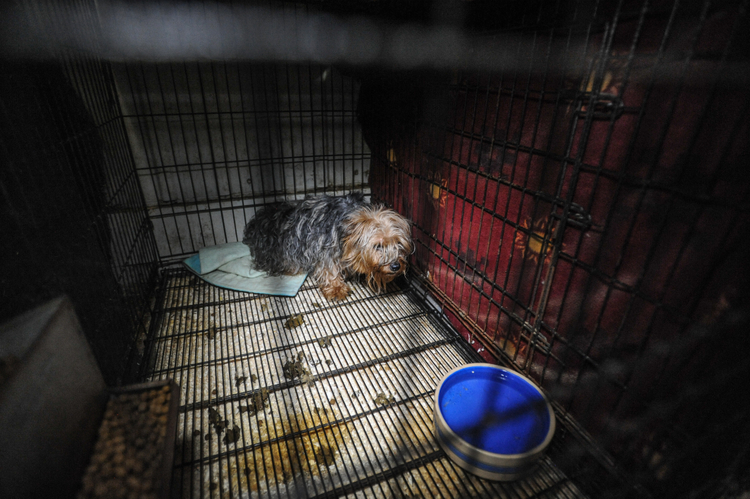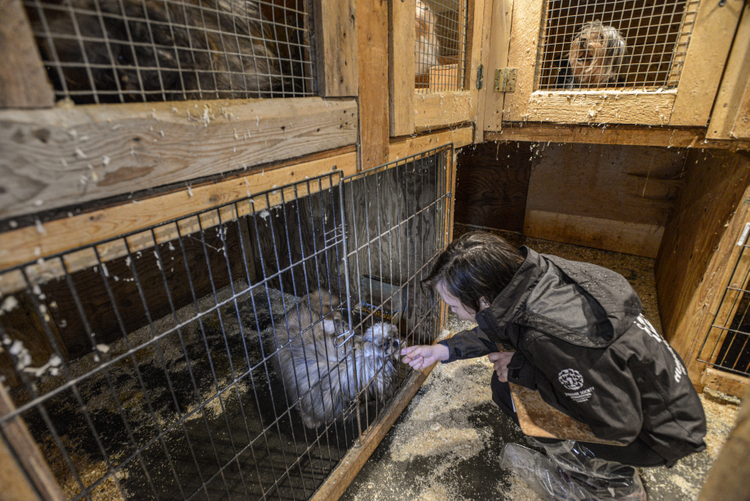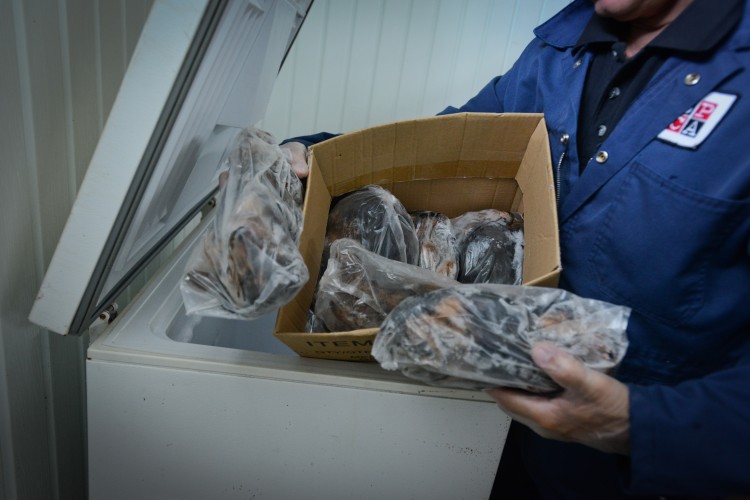Commercial dog breeders are in the business to make money by breeding dogs. Dogs who are bred for profit are at risk of not being bred responsibly, humanely, knowledgeably or compassionately. Commercial dog breeders cut corners to save money, at a cost to their dogs and puppies. Irresponsible, profit-driven dog breeders often don’t know how to breed dogs responsibly and only provide the bare minimum to keep their dogs alive and producing. To do this, they keep dogs confined in filthy, overcrowded and inhumane small wire cages where they cannot move freely, are fed minimal amounts of poor-quality food, are provided no veterinary care, often live outside in extreme heat and cold, and live in loneliness with no socialization. These breeders don’t care about the dogs. They care about your money.
Puppy mills are essentially dog-making factories, similar to factory farms, but for dogs. There are more than 10,000 puppy mills in the United States, producing about 400,000+ litters of puppies every year, if you can imagine. Mother dogs spend their entire lives in tiny wire cages with no human contact or attention. When the parent dogs can no longer breed, they are disposed of or killed, as are unwanted puppies.
Fewer than 3,000 puppy mills are licensed and regulated by the United Stared Department of Agriculture (USDA), leaving the vast majority of puppy mills unlicensed and unregulated. These breeders often operate in secret and go to great lengths to avoid discovery. Puppy mills treat their dogs like things or units of production, never acknowledging the sentience, well-being or suffering of the dog. They breed their dogs in the most deplorable conditions imaginable, repeatedly raising unhealthy and often dying dogs. They sell their puppies at a prematurely young age (to save money on needed continued care) to pet stores, dog auctions, and online websites—usually through brokers or middlemen that take a handsome cut of the profits. Some puppy mills sell directly to the public, including online or through newspaper ads, swap meets and flea markets. Most puppy mill puppies are shipped thousands of miles away to pet shops, where unsuspecting customers purchase them, unaware of the misery they come from.

One problem with getting a puppy from a bad commercial breeder, backyard breeder or puppy mill is that you inherit a young dog that has had a very bad start in life. The puppy will likely develop genetic health conditions, leaving you responsible for enormous veterinary bills over their lifetime. Not to mention, you will watch your helpless dog suffer a lifetime of pain and discomfort that was entirely unnecessary. By not buying a dog from these profit-driven dealers and stores, you will not only save yourself money and problems, but you won’t be supporting the continued cruel breeding of dogs from unscrupulous commercial dealers and mills.
The majority of puppy mills in the United States are located in the Midwest, with the greatest number located in the state of Missouri. Upstate New York, Ohio, Indiana and Pennsylvania also have very high concentrations of puppy mills.
USDA licensing standards for commercial dog breeders
The vast majority of puppy mill breeders are operating illegally without a license. It is unknown how many illegal, unlicensed dog breeders there are in the U.S. because they are difficult to track down. The Puppy Mill Project estimates that there are as many as 10,000 puppy mills across the country.
What does USDA-licensing actually mean? USDA licensing standards are notoriously negligible and minimal. Said the Humane Society of the U.S., “Under USDA standards, it is legal to keep dozens or even hundreds of breeding dogs in small wire cages for their entire lives with only the basics of food, water and rudimentary shelter. But many USDA facilities have been found in violation of even these minimal standards. It is extremely rare for the USDA to revoke a commercial breeder’s license or even fine a puppy mill that has repeated violations. As a result, there are hundreds of USDA-licensed puppy mills in operation that have a history of documented animal care violations that are still licensed.”

Beware of dog auctions
Another channel for profit-driven commercial and backyard breeders to sell their dogs is through dog auctions. Dog auctions are illegal in many states, but they serve as a major distribution channel for buyers and sellers in 15 states, mainly throughout the Midwest. Most of the breeders involved have received repeated violations of the Animal Welfare Act (AWA) and have been convicted of numerous counts of animal cruelty. It is a business rife with greed, corruption and consumer fraud, not to mention animal cruelty. Read more about dog auctions from one state that is working hard to shut them down, the Coalition to Ban Ohio Dog Auctions.
Watch out for the middlemen: dog brokers
Puppy and dog brokers are the middlemen, people who buy dogs from other sources like illegal puppy mills, and then sell them to pet stores, online, or directly to unsuspecting people. Brokers buy litters of puppies and dogs from puppy mills, out-of-state shelters, online, or classified ads. They are looking for cheap dogs, and then they increase the price ten-fold when they sell them. They love seeing “free to a good home” ads, and prey on them. They often pose as breeders themselves, and con unsuspecting buyers, claiming that they don’t buy from puppy mills. Read more here about dog brokers and how to identify them.
Legislation
As the American public becomes enlightened to the truth and horrors about puppy mills, there has been an increase in the number of new bills addressing this animal welfare issue. For more information, see puppy mill laws by state.

What you can do
- Adopt a dog from your local animal shelter or rescue organization. Save a life, adopt don’t shop! Adoption should always be the first option.
- Adopt a breed-specific dog from a rescue group or shelter before searching for a breeder. If you have your heart set on a particular breed, there are many breed-specific rescue organizations.
- Never purchase a dog online and never have a puppy shipped to you. These dogs are usually puppy mill dogs.
- Never support puppy mills or commercial breeders by purchasing your pet from a pet store, auction, flea market or backyard breeder. Otherwise, you support the continued pain and suffering of more dogs and puppies in this inhumane system.
- Speak out against puppy mills and commercial breeders. Share about the topic with friends and family and on social media. Tell people you know who are thinking about getting a new dog about why adoption is the only humane option.
- Get involved. Many organizations are working to make change, increase protections for dogs, and ban puppy mills. Shelters and rescue organizations also do so much good work to provide an alternative and help dogs in need. Find an organization you like and ask them how you can help.
This article was compiled from the Humane Decisions website.
Featured image: a neglected dog being rescued from a puppy mill. Image credit Jo-Anne McArthur / We Animals with Humane Society International.





